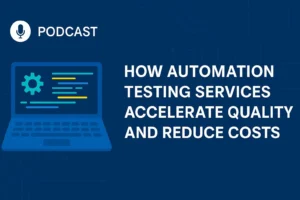How Automation Testing Services Accelerate Quality and Reduce Costs

Transcript
Welcome back to the Testers HUB Podcast. I’m your host, Vijay, and in this episode, we’ll explore automation testing services—what they are, why they matter, and how they accelerate quality while reducing costs.
Our discussion will cover four areas: first, the growing demand for automation in QA; second, challenges businesses face when automation is not part of their strategy; third, examples of real-world applications; and finally, how structured automation testing drives long-term business value.
Section 1 – The Growing Role of Automation in QA
Modern software development moves fast. Agile sprints, CI/CD pipelines, and frequent releases demand that testing keeps pace. Manual testing remains valuable, but it cannot always meet the speed and coverage required today.
Automation testing solves this by using scripts and tools to run repetitive checks efficiently. Regression testing, smoke tests, and cross-browser validations can all be automated, freeing QA teams to focus on exploratory and usability testing.
The benefits are clear: faster feedback cycles, broader test coverage, and reduced human error. Businesses can deliver features confidently without slowing development.
Automation is not about replacing human testers. It’s about enabling them to work smarter. By combining manual expertise with automation speed, companies achieve both efficiency and depth.
Section 2 – Risks of Not Adopting Automation
Organizations that rely solely on manual testing face several risks:
- Delayed Releases: Regression cycles take too long, slowing product launches.
- Limited Coverage: Testing every scenario manually is impractical, leaving gaps.
- Inconsistent Results: Human error leads to missed defects or incorrect validations.
- Higher Costs: Manual repetition consumes valuable tester time and budget.
- Reduced Competitiveness: In fast-moving markets, speed is critical. Without automation, companies risk falling behind.
These risks are magnified for complex platforms such as eCommerce, banking, or SaaS applications, where features evolve rapidly. Without automation, ensuring stability after every update becomes nearly impossible.
Section 3 – Real-World Applications of Automation
E-Commerce Platform:
A global retailer automated its checkout flow and product search tests. Each new release previously required days of manual regression. Automation reduced testing time by 70%, enabling weekly deployments without risk.
Banking Application:
A financial services client integrated automation for login, transaction, and balance verification. Automated scripts ensured that every build maintained compliance with security requirements. This improved trust and reduced costly production defects.
Healthcare SaaS Tool:
In a healthcare platform, automation covered form validations, role-based access, and data exports. This not only reduced manual workload but also ensured consistency across critical workflows where patient safety was at stake.
Cross-Browser Testing for Media Site:
A media company automated compatibility checks across Chrome, Safari, Firefox, and Edge. What once took testers three days now runs in a few hours, with detailed reports generated automatically.
These cases prove that automation is not theoretical—it delivers measurable efficiency, cost savings, and confidence.
Section 4 – Structured Automation Testing and Business Value
At Testers HUB, our automation approach begins with feasibility analysis. Not all tests should be automated, so we identify high-value candidates first. Next, we design robust test scripts using tools such as Selenium, Cypress, or Playwright. These scripts are integrated into CI/CD pipelines for continuous validation.
The business benefits are significant:
- Faster releases with fewer bottlenecks.
- Lower long-term testing costs.
- Higher accuracy through repeatable, reliable tests.
- Greater scalability as products evolve.
By combining automation with manual expertise, we ensure both speed and depth, helping businesses launch with confidence while optimizing resources.
Closing
In summary, automation testing services accelerate QA, reduce costs, and enable faster releases without compromising quality. In today’s competitive markets, businesses cannot afford to ignore automation.
At Testers HUB, we help companies design and implement tailored automation strategies that align with their goals. From eCommerce to banking and SaaS, our structured approach delivers measurable results.
Thank you for tuning in to this episode of the Testers HUB Podcast. To learn more, visit testers-hub.com/automation-testing-services or book a consultation with our QA experts today.








